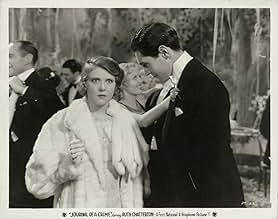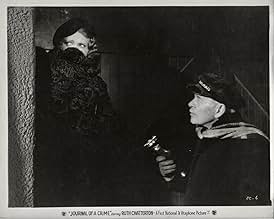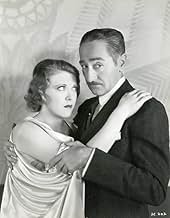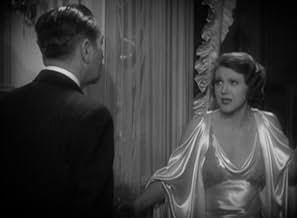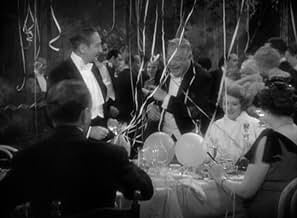Adicionar um enredo no seu idiomaA wife shoots her husband's mistress. Afterwards, she is tormented by guilt when someone else is blamed for the crime.A wife shoots her husband's mistress. Afterwards, she is tormented by guilt when someone else is blamed for the crime.A wife shoots her husband's mistress. Afterwards, she is tormented by guilt when someone else is blamed for the crime.
- Direção
- Roteiristas
- Artistas
- Germaine Cartier
- (as Douglas Dumbrille)
- Frau Winterstein
- (as Elsa Jansen)
- Paul's Valet
- (não creditado)
- Chorus Girl
- (não creditado)
- Man at Play Party
- (não creditado)
- Direção
- Roteiristas
- Elenco e equipe completos
- Produção, bilheteria e muito mais no IMDbPro
Avaliações em destaque
** 1/2 (out of 4)
Decent melodrama from Warner has Ruth Chatterton playing a wife who finds out that her husband (Adolphe Menjou) is in love with another woman (Claire Dodd). Fearing that she's going to lose him forever, the wife shoots the lover and gets away with it but when the husband finds out he decides not to tell anyone because he feels the best justice is for his wife to slowly crack under the guilt. This pre-Code isn't the greatest film ever made and there are quite a few problems with the story but the performance of Chatterton makes it worth sitting through if you enjoy this period of Hollywood. I think the best thing going for the film is the performance of Chatterton who is quite believable as the grieving wife. The screenplay goes all over the place with her character so Chatterton has to go through a wide range of emotions. She nails everyone of them and especially the scenes early on when she learns that her husband no longer loves her and she does what she can to try and save her marriage. This good sequence is followed by her slowly turning to rage when she realizes that it really doesn't matter what she does as the husband has his heart made up. Chatterton has always been an underrated actress and her performance here proves she could handle just about anything. Menjou is always good and that continues here as he could play this type of role in his sleep. I especially loved the way he remains calm, cool and collective while trying to force the guilt trip on the wife. Dodd doesn't appear in the film for too long but she's good while there. The screenplay is the main villain here because it's never quite clear where the picture wants to go and while I won't ruin the ending I will say it's incredibly stupid as it really doesn't close anything up. Yes, it closes the "past" up but everything with the husband and his feelings are pretty much untouched. At just 64-minutes the film moves well enough and is okay for a one-time viewing.
- BANG! -
Then the crime takes place, and by amazing coincidence a bank robber just happens to be hanging around backstage to take the fall for the real culprit. The coincidences now start piling on faster and faster, crammed into an incredible 64 minutes whose tortuous twists and turns are probably the result of the writing being on the wall about the new Production Code just months away. The code wasn't in force yet, so both adultery and murder go unpunished; but the narrative that follows twists itself into greater and greater contortions in seeming anticipation of Joseph Breen's coming blue pencil.
Francoise Mollet (Chatterton) gets wind her husband, Paul (Adolph Menjou) is having a serious dalliance with a stage actress that threatens her marriage. When she fails to reverse his course she heads to the theatre and blows the thespian mid rehearsal away. By the oddest coincidence though a bank robber who has just murdered a teller takes refuge at the playhouse is captured and charged with her murder as well. Paul knows better however and decides to let his "fiend" wife stew in her own juices before confessing.
The preposterous scenario is too far fetched to give Journal of a Crime a passing grade but Ms. Chatterton is every bit as effective as she was in the classic Dodsworth living out the same self absorbed, petty existence of delusion and humiliation but with more dire consequence. Menjou displays some interesting restraint as Paul who in his own way and with less explanation does some unorthodox enabling that not only keeps Ruth from being fried but also buys enough time to have another misfortune benefit her. The turn of events that may save Francoise however only builds the case against the incredulous plot that dooms this film.
Você sabia?
- CuriosidadesThe opera shown on the theatrical posters in the opening scenes is "Adelia," by Donizetti.
- Erros de gravaçãoSomeone as "highly intelligent" as Francoise would not have disposed of the murder weapon in a bucket of water, where someone would be sure to find it.
- Citações
Dinner Guest: The way I look at it, Mr. Attorney General, there will be crimes of passion as long as there is passion.
Germaine Cartier: In my opinion, madame, the urge to kill has roots in hatred, rather than in passion or in love. Hatred in it's most severe form. Jealousy. Don't you agree with me?
Francoise Moliet: Well, you may be right, Mr. Attorney General. I don't know, but, a woman - or a man - may have a deeper motive for killing than jealousy or even love. A human being could kill because she herself has first been killed. Before she kills, the other two, the victim and her accomplice, must have killed her soul. Murdered it. A soul that murders in it's turn.
- Cenas durante ou pós-créditosOpening credits are shown on the pages of a book, a reference to the "journal" in the title.
- ConexõesRemake of Une vie perdue (1933)
Principais escolhas
Detalhes
- Data de lançamento
- País de origem
- Idiomas
- Também conhecido como
- Journal of a Crime
- Locações de filme
- Empresa de produção
- Consulte mais créditos da empresa na IMDbPro
- Tempo de duração1 hora 5 minutos
- Cor
- Mixagem de som
- Proporção
- 1.37 : 1
Contribua para esta página


